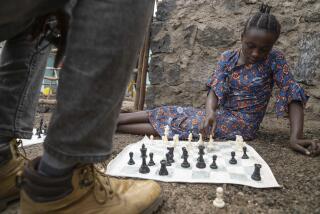BELL GARDENS : These Youths Love to Play Mind Games
- Share via
Bell Gardens is fast becoming a sanctuary for young chess players.
In a region where some kids have to think fast to survive on the streets, two footholds have emerged where youths can go and exercise their minds with chess.
For five years, teacher Ed Portillo, 46, has been helping youngsters learn to think logically at Bell Gardens High. Not in his mathematics class, though, but through the school’s chess club.
“There’s a high level of thinking that goes on with this game, and many math departments encourage it,” Portillo said, adding that he devotes an entire week to the game as part of his math instruction.
The chess hobbyist teaches freshmen through seniors the strategies of beating an opponent with the mind.
Only a handful of high schools in central Los Angeles have chess programs, and these are only for students enrolled at the schools. In the 1970s and ‘80s, a strong core of players maintained a chess presence in the area with professional teams coming out of clubs from East Los Angeles high schools Roosevelt and Garfield.
Programs at Bell Gardens’ Suva Elementary School and at Huntington Park and South Gate high schools also fielded respectable teams until recently. But when their coaches retired, the teams were in a checkmate, finished.
Portillo’s club has had considerable success, winning numerous regional and state championships.
Last weekend, the Bell Gardens High Chess Club competed at the U.S. Amateur Team Playoffs, a low-key U.S. Chess Federation-sanctioned tournament. Although there were only two entries in the tourney, the Lancers won the title at the scholastic level.
Next weekend, the club won’t have to go far when it competes in the Southern California State High School Chess Championships at the Bicycle Club. The winning school will represent Southern California in the Denker National Scholastic Championship, to be held in August in the Bay Area.
International chess master and Times chess editor Jack Peters said a program usually is as strong as the person who’s running it.
“As long as that person is interested in doing it, the program survives. When that person moves or is tired of it, the club is liable to fold,” he said.
Besides a newly formed Bell Gardens Library club, there are no public clubs in the Southeast area. The closest lies in Long Beach at the Chess Palace, where advanced players compete.
“That’s why I want to get it going because there’s no place for kids to play chess,” said Gregory Olmos, 50, who runs the library club and is a fourth-grade teacher at Bell Gardens Elementary School.
He attempted to start a chess club in Boyle Heights, where he lives, but couldn’t find any support there. He took up an offer by longtime friend Orlando Castillo, a former library assistant at the Bell Gardens Library.
Club membership has fluctuated since the first weekend in January, when Olmos started the club. The first meeting attracted about 40 people of all ages, and he’s managed to maintain a steady membership of about 20 people each week.
“I like the idea that you can use your mind to beat people,” said Juan Gutierrez, 14, who has been playing chess for one year and recently joined the club. “I’d rather be (playing chess) than going out and doing nothing.”
Although Olmos plans on eventually obtaining U.S. Chess Federation recognition for his club, right now he is focused on maintaining the interest of his novice players.
He said the better players have been motivated to stay with the club because they are good, “but some of the new kids might be discouraged because they want to learn overnight--those are the ones I’m trying to keep,” said Olmos, who competed for several years for a now-defunct club in Monterey Park.
“The problem is that chess demands a lot of concentration. It’s like learning how to play an instrument. It takes time and patience.”
Olmos recommends chess as a deterrent to social dangers such as drug use and gang involvement.
Peters, the chess master, said the game is like another world because players often have nothing in common except the game.
“You are in control of your destiny in this world, and this is appealing, especially to those who feel they are not given a fair shot” in this world, Peters said.
In the two hours that the library club meets, Olmos sets up four tables where the various levels of players strategically spar on the chessboard. He teaches the basic moves, “which are like learning the times tables.” He then adds in tactical play.
“In two or three months, they should be ready to play against (better) players,” Olmos said.
Russian grandmaster Garry Kasparov remains No. 1 in the chess world, but “the next world champion might be from here,” Olmos said.
Information: (310) 927-1309.
More to Read
Get our high school sports newsletter
Prep Rally is devoted to the SoCal high school sports experience, bringing you scores, stories and a behind-the-scenes look at what makes prep sports so popular.
You may occasionally receive promotional content from the Los Angeles Times.






